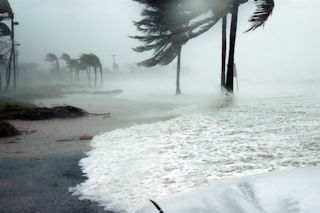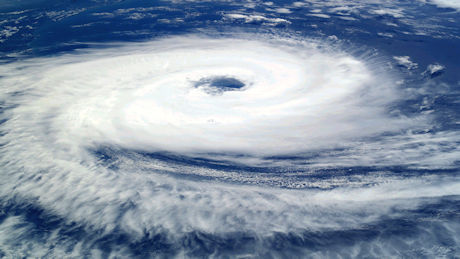Hurricane Diary Worksheet
Experiencing a hurricane must be very frightening! This diary worksheet asks the kids to imagine a hurricane has hit their town - can they record the event in this diary?
&npsp;
These powerful tropical storms can be up to 1,000 miles (1,600 km) wide, and up to nine miles (14 km) tall! They form over the ocean in warm, tropical areas and when they reach land, they cause great devastation.

The word ‘hurricane’ comes from ‘Huracan’ – the god of big winds and evil spirits worshipped by the ancient Maya people of Central America. In the Indian Ocean, they are called ‘Cyclones’ and in the Pacific Ocean, they are called ‘Typhoons’.
The storms form when the ocean water is 80ºF (26ºC) or warmer. This can happen between June and November (in the Caribbean/Atlantic) or as early as April/May (in the Indian Ocean and Pacific). When warm, moist air rises over the ocean, it is replaced by cooler air, which warms and rises as well. If winds blow in the same direction, this cycle can form huge storm clouds that begin to rotate with the Earth’s spin.
The centre of the hurricane (called the ‘eye’) is the calmest spot, but at the edge of the eye (the ‘eyewall’), winds can reach 80–150 mph (129–241 kph) – the speed of an intercity train!
Some hurricanes are over in a few days, while others last several weeks. Strong winds, heavy rain and large waves (known as storm surges) cause severe damage, flooding and sometimes landslides and mudslides. Hurricanes lose some of their strength when they travel over land, so coastal areas are the hardest hit.

The eye of the hurricane
We’re lucky not to have hurricanes in Britain but we do have severe storms or gales (strong winds). One of the worst was the Great Storm of October 1987 where winds of up to 100mph (161 kph) caused widespread devastation and 18 fatalities. Many buildings were damaged and about 15 million trees were uprooted (causing delays to road/rail, and disturbing power supplies).
Experiencing a hurricane must be very frightening! This diary worksheet asks the kids to imagine a hurricane has hit their town - can they record the event in this diary?
Imagine you're a newspaper reporter writing about a hurricane. Perhaps include lots of descriptions of the event, and eye-witness accounts too?
Hurricanes are massive storms with lots of strong wind and rain - and it looks like the one on this poster is very powerful indeed! Print this poster to use in displays or project work about the weather...
This fascinating photo shows an aerial view of a hurricane - tropical cyclone Catarina. It shows us exactly what is meant by the "eye of the storm".
Do some research then practise writing skills by writing a safety leaflet about hurricanes. Print and fold along the dotted lines to make a 3-panel leaflet.
This hurricanes cloze worksheet is an interesting way to learn a little more about hurricanes. We've provided a number of words to be used to fill in the blanks.
Our factsheet is a great introduction to hurricanes - perfect just to read, or to use alongside some of our weather activities.
Hurricanes can be very dangerous and often do a lot of damage. This posters asks the children to design a poster alerting others to the dangers of hurricanes, and asks them to write the best advice for staying safe.
Use this dramatic story paper to write down what you've learned about hurricanes, or perhaps to write a story about one...